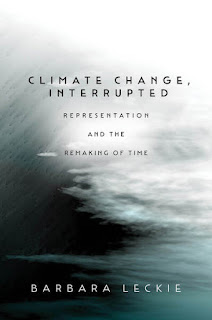 (2018), among other books, and coordinator for the Carleton Climate Commons.
(2018), among other books, and coordinator for the Carleton Climate Commons.
Leckie applied the "Page 99 Test" to her new book, Climate Change, Interrupted: Representation and the Remaking of Time, and reported the following:
Page 99 is in “Layering,” the first chapter of the second section of my book. The chapter is composed of six bands that tell six stories. And so any summary of the page is impossible insofar as it offers no obvious argument and even the stories it tells are fragments. The first band, comprised of a single line on the page, is a running band that strings together quotations referring to grass. The sixth band, also comprised of a single line, strings together quotations referring to sand. The four middle bands enter into the middle of stories about Percy Shelley’s last days before he died, my reading of the Derrida essay that gave me the idea for writing in bands, ellipses in Virginia Woolf’s A Room of One’s Own, and, in the fifth band, reflections on rocks and words. While it may seem unfortunate that page 99 falls in such an impossible-to-summarize part of my book, it is apt for the goals of my book overall, a book that attends to the role of interruption in responding to the climate crisis. For the page itself is at once filled with interruptions and is about interruption. And interruption, capaciously understood, I argue, can contribute to more just and equitable climate action. But such action is unlikely to occur without interrupting the prevailing temporal forms, including forms as basic as the academic book and as all-encompassing as time, by means of which thinking happens.Visit Barbara Leckie's website and learn more about Climate Change, Interrupted at the Stanford University Press website.
“[I]s equally perfect” and “fragile”: these are the first and last words on page 99. The first band falls in the middle of a quotation from Walt Whitman and the last band is from the middle of a quotation from Rachel Carson. When I wrote this chapter I was curious about how it would be read. Would readers turn to each band individually and read across the page in that way? Or would they read up and down? Or would they do both? For this reflection, I am reading up and down, I am putting Whitman and Carson into dialogue as well as, in the other bands, Mary Shelley, Jacques Derrida, Virginia Woolf, and Lauret Savoy.
When I do this it is hard not to feel a little at sea (and, to be sure, the entire chapter is about storms and being at sea, both literally and figuratively). A little lost. I know these bands well but, even so, I have to check myself and ask, where am I? It is a feeling that the climate crisis creates as well if one stops, interrupts one’s self, and considers. As it happens, to the degree that this page has a focus, its focus is wandering and getting lost. In the best sense. Both Percy and Woolf’s narrator value getting lost as a form of thinking, indeed, in Woolf’s reflections, as a form of truth. Percy improvises a flimsy canvas boat that may float, Derrida’s book is falling apart and yet readable, Woolf’s narrator gets lost and yet she keeps walking, Savoy’s words “blaze with intensity” and yet are modest. Improvising, reading, walking, blazing—these are all ways to get lost. And getting lost, as Woolf notes, is the point, the point that falls like sand, like binding glue, like words,...
I like to think of the bands jostling against each other, as stones do when they bump up against each other, shifting into something different, becoming smaller and bigger at once. I was surprised to see that both the first and last band refer to grains of sand. I imagine the “equally perfect” grain of sand on the top of the page falling down to meet the “fragile” grain of sand at the bottom. I want to hold the tensions and movement of the page together. I read the first word and last word together: “is ... fragile”—being is fragile.
--Marshal Zeringue



